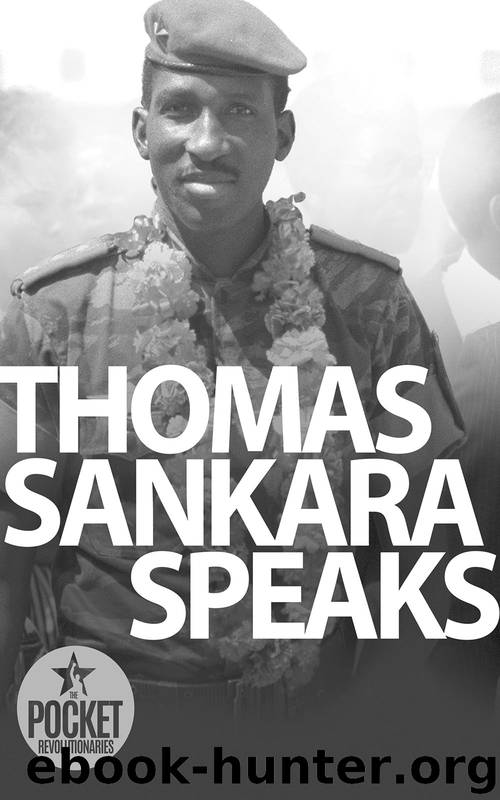Thomas Sankara Speaks by Thomas Sankara

Author:Thomas Sankara
Language: eng
Format: epub
Publisher: Kwela
Published: 2016-07-27T09:33:49+00:00
The CDRs’ job is to raise consciousness, act, produce
(At First National Conference of CDRs, 4 April 1986)
The First National Conference of the Committees for the Defence of the Revolution (CDRs) was held in Ouagadougou from 31 March to 4 April 1986, attended by more than 1,300 delegates. This speech was published as a pamphlet by the National Secretariat of the CDRs.
After the show we’ve just seen, after what we’ve just heard, my task is easy. It’s easy because I will have only a few things to say to you.
Dear comrades;
Dear invited guests:
Here we are after some hard work. Here we are after a special kind of test, the first of its kind, in the course of which the Committees for the Defence of the Revolution voluntarily and consciously agreed to take a critical look at themselves. They have been in session nonstop day and night, in the spirit of criticism and self-criticism, in order to examine the work they’ve done over the two and a half years of revolution in Burkina Faso. This principle is a victory in itself. Victory in the sense that only revolutions are willing to question themselves, only revolutions are willing to draw critical balance sheets of their struggle. By contrast, the forces of reaction spend their time singing their own praises and blowing their own trumpet, only to end in inevitable failure. [Applause]
Comrades, I first want to ask all the foreign delegations who could not be represented here to please understand and excuse this procedure. The fact that we felt that this First National Conference of the CDRs should be conducted largely in closed session, that is, exclusively among Burkinabè, does not mean that we undervalue the internationalism that binds us to other struggles. I’m convinced they will grant us their indulgence and their understanding.
Indeed, around the world messages had been prepared to be sent to us. Delegations were to be sent, too. We ask all the fraternal countries, all the sister revolutions that were understanding and refrained from sending their delegations, we ask them to transmit to their members the internationalist greetings of the Committees for the Defence of the Revolution of Burkina Faso. [Applause]
I would like to thank the Pioneers who were present here and who enlivened this first national conference from beginning to end. For us, the Pioneers constitute hope, the hope of tomorrow. They symbolise and represent the future within the present. But at the same time they show each of us our daily task. What these young revolutionaries become, their evolution, directly depends on how conscious we are about the way we carry out our responsibilities toward them. As revolutionaries we have no right to think that the Pioneers should be kept on the sidelines of revolutionary activity, to be included in our activity only once they reach the age of eighteen.
Wherever revolutionaries are directly concerned with the lives of these Pioneers, they should assume their responsibilities – to guide, to educate, to raise the consciousness of these young children so they grow up as revolutionaries, live as revolutionaries, and die as revolutionaries.
Download
This site does not store any files on its server. We only index and link to content provided by other sites. Please contact the content providers to delete copyright contents if any and email us, we'll remove relevant links or contents immediately.
| Africa | Americas |
| Arctic & Antarctica | Asia |
| Australia & Oceania | Europe |
| Middle East | Russia |
| United States | World |
| Ancient Civilizations | Military |
| Historical Study & Educational Resources |
Goodbye Paradise(3811)
Men at Arms by Terry Pratchett(2839)
Tobruk by Peter Fitzsimons(2518)
Borders by unknow(2316)
Arabs by Eugene Rogan(2301)
Pirate Alley by Terry McKnight(2226)
More Than Words (Sweet Lady Kisses) by Helen West(1867)
Belonging by Unknown(1859)
It's Our Turn to Eat by Michela Wrong(1731)
The Biafra Story by Frederick Forsyth(1657)
The Source by James A. Michener(1616)
Botswana--Culture Smart! by Michael Main(1603)
Coffee: From Bean to Barista by Robert W. Thurston(1549)
A Winter in Arabia by Freya Stark(1539)
Gandhi by Ramachandra Guha(1535)
The Falls by Unknown(1527)
Livingstone by Tim Jeal(1491)
The Shield and The Sword by Ernle Bradford(1411)
Africa: Altered States, Ordinary Miracles by Richard Dowden(1387)
